|
Welcome to A&A. There are 37 full reviews in this issue. Click on an artist to jump to the review, or simply scroll through the list. If you want information on any particular release, check out the Label info page. All reviews are written by Jon Worley unless otherwise noted. If you have any problems, criticisms or suggestions, drop me a line.
|
|
|
A&A #219 reviews (7/16/2001)
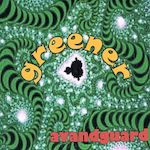 Avandguard
AvandguardGreener (self-released) Avandguard is Mike Kondol. He plays everything, from acoustic guitar to orchestrating synth to percussion to bass to... you know, everything. The style is a clunky form of roots rock, with some window dressing. Kondol's songs don't always fit together. Sometimes this is a good thing. A song that flows along too easily doesn't require a listener to think. Thinking is good. But too much effort, especially with music like this, can be a killer. I can hear Kondol working. He's not the greatest singer, though his strained vocals work very well with his songwriting style. They're fine. But he's also put a lot of effort into playing and producing this disc. The songs would roll along a little better if I couldn't hear the bulk of that work in the finished product. Sweep it behind the curtains or something. More work is the solution, really. Kondol is just beginning. He's got some good instincts, and there are quite a few enjoyable moments on this disc. A little more craft, a little more skill and some of the rough edges can be smoothed over. his kinda music should never be shiny, but it shouldn't be pocked, either.
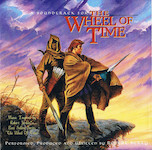 Robert Berry
Robert BerryA Soundtrack for the Wheel of Time (Magna Carta) If you don't know, The Wheel of Time is a series of astonishingly thick (in terms of pages, I mean) fantasy books written by Robert Jordan. I haven't read them; they came along a few years after my own flirtation with fantasy passed. I have a few friends, though, who swear by them. And I've always liked the idea of soundtracks for books. As you might expect from a Magna Carta release, Robert Berry takes a prog approach to his work. He incorporates plenty of Celtic and other ancient European folk styles (the kinda stuff that just about everyone links with the "days" of swords and sorcery. The songs are classical in composition. Berry takes a theme and works it through a few variations. He obviously knows what he's doing. Sound grandiose and overbearing? Then you haven't read the books. Even many folks who like them will admit that the stuff is overwritten and pretentious. See, that sorta thing works in the fantasy genre. If you're creating another world, you've gotta really set it all down. Berry does a very good job of illustrating Jordan's creation. I guess that's the best way to judge this. Standing alone, well, this might be just another excessive orchestral prog record. But put in its proper context, this album really does make sense. Kinda what I expected, but in a good way. Berry has done his homework and created a worthy soundtrack.
������������������������������������� 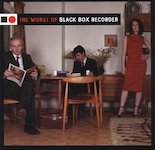 Black Box Recorder
Black Box RecorderThe Worst of Black Box Recorder (Jetset) Odds and ends, b-sides, remixes, videos, etc. Some better than others. Strangest of all is the first track, a rather straight cover of "Seasons in the Sun," a song that I've always found dreadfully trite. Almost as bad as Love Story, the book or the movie. One of those 70s moments that keeps coming back, whether I like it or not. The rest is uneven, as any such collection must be. There are some interesting side trips, and since Black Box Recorder is rarely dull ("Seasons in the Sun" notwithstanding), I was always interested in what lay around the next corner. A nice set for the rabid fan (I'm one of those). Unlike the band's albums, this disc has absolutely no cohesion and probably won't appeal to the uninitiated. There are more than a few tangents here that only make sense if you know what has come before. But that's okay. Art isn't always pretty and it doesn't always make sense. Black Box Recorder, though, is always worth hearing. Even when it takes a misstep or two. Especially then, to be honest. It's good to know that even great ones have an off day now and again.
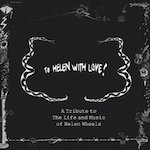 The Brain Surgeons
The Brain SurgeonsTo Helen With Love: A Tribute to the Life and Music of Helen Wheels (Cellsum) Another New York insider disc from the Cellsum folks. A lot of the same names wandering around the David Roter album are here: Handsome Dick Manitoba (who kinda explains the reasons behind this disc), Buck Dharma, Andy Shernoff, Albert Bouchard, etc. The Brain Surgeons are led by Bouchard and his wife, Deborah Frost, and indeed, a few of Helen Wheels writing credits are from old B.O.C. tunes--which are reproduced somewhat unfaithfully here. It's kinda funny. While the titular names of the "acts" change, the players are the same, simply coming together in a number of different combinations. The proper artist designation is probably what's on the spine, "Brain Surgeons and Friends." But enough of this conundrum. Aw, well, it's a tribute and there are an awful lot of people on this disc. Everyone here knew Helen Wheels, and they obviously loved her. That emotional current is what drives this disc, and it makes listening a most satisfying experience.
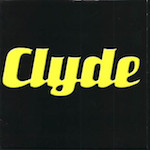 Clyde
ClydeClyde (Baby Julius) Keepin' the grunge torch alive, with a rap-core infusion. Clyde has all the conventions down: Soaring vocal lines, bombastic bass lines and anthemic riffage. Very nice, if that's yer bag. And there are a few modern conventions beyond the rap stylings. The tone is muted; while the songs are pretentious and excessive, the sound is restrained. Kinda like the first Pearl Jam album. You know, where you could hear every instrument. Hear what was going on. I like that about Clyde. Maybe this is the sound that might win over the Dockers crowd to the new jack. Not too threatening, plenty tuneful. None of that revolution silliness. If that's where these guys are aiming, well, they might have something. It's not my scene, mind you, but these are talented guys who can write and play solid songs. That's gotta count for something. And it oughta get them somewhere, even if the destination isn't the one they had in mind.
Dale Collins All Solace Inland cassette (self-released) Another tape from Dale Collins, which finds him in a somewhat more moody and introspective mood. The songs fit in with the minimalist roots movement (Palace, etc.) as much as the rural blues. More screed-like, too, than the last tape I heard. That's too bad. I kinda liked the more oblique approach Collins took to his commentary on that earlier effort. The lyrics here are almost stream of consciousness, the sort of artless tell it-like-it-is style that can get grating. Still, the effect of his playing and singing together is still transfixing. And often enough, Collins finds a groove and really spins quite a spell. When he's locked in, few can tell a story better. The recording quality is minimal, but since it's just Collins and his guitar (or piano, as on the last song), that's not a big problem. Some of the pieces here sound rushed--not completely worked out. On the other hand, a song like "Badass" more than makes this set worthwhile. Collins simply needs to transform some of the intellectual fire of the more topical songs into the visceral glee and pain of that piece or "End Feudalism Now" (a political song that also qualifies as blistering art). As it is, this tape merely impresses me. Which isn't bad at all.
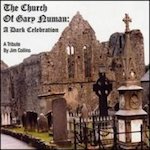 Jim Collins
Jim CollinsThe Church of Gary Numan: A Dark Celebration (self-released) There's a great quote on the back of this disc. "One day my daughter said, 'You love Gary Numan so much, you should start a church for him.'" Judging by this disc, I'd say Jim Collins is quite the devotee. He adds a few modern industrial conventions to Numan's work, and despite his obvious love of the originals, he's taken a few liberties with the pieces, particularly when it comes to the beatwork. Now, the overall sound still lies in that sterile techno universe that Numan helped to define, but that's really the only concession to convention Collins makes. He has his own thoughts as to how he wants the songs to sound, and he's willing to mess with the "master" in order to express his own ideas better. All to the good. As the title implies, this disc is more of a celebration than tribute. All of Collins's hard work has paid off. One impressive package of songs.
 Darkest Hour
Darkest HourSo Sedated, So Secure (Victory) Blurring the line between extreme hardcore and death metal almost to incomprehension, Darkest Hour is probably best described as simply "mean." These songs rumble and thrash past with not so much as a passing glance. Cascading drum breaks and melodic lead guitar lines provide most of the easy access points. Past that, Darkest Hour delves into maelstromic washes of excess. Perhaps the songs could be centrifuged out, but I doubt it. This stuff is stuck in permanent solution. Which is not to say I don't like it. Quite the opposite. Darkest Hour isn't one of those bands that switches gear constantly. It's always pushing the pedal to the floor, and that sense of forward motion serves the sound well. Onward to the apocalypse, man. I'll follow. So what if this is pretty much an album of hoary rants? That works for me. I've bitten into the adrenaline wire and now I can't let go. Too much pleasure flowing into my veins.
������������������������������������� 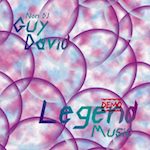 Guy David
Guy DavidLegend Music EP (self-released) On the cover, he's billed as "Non DJ" Guy David, but I figured I'd list this under his regular name. Call me anal or whatever. David may not be a DJ, but he does traffic in electronic music. Panoramic dry techno, to be more specific. Very much from the German school. The sound is about as artificial as you can get. I'm not complaining; I'm just describing. In fact, David has a real nice feel for this kinda stuff. The lines move in abstract ways, with his beats keeping the pieces together. Real nice. Four songs that fit together well without sounding alike. David does have a nice handle on this sound, and he knows how to put his own music together. Fine work.
������������������������������������� 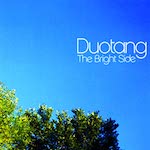 Duotang
DuotangThe Bright Side (Mint) Mint Records always knows when it should find me. Like whenever there's a new Duotang album. The band is still two guys wielding a bass, drums and organ (not all at the same times, of course). Some friends stop by to fill out the sound every now and again. The title is appropriate. These songs aren't quite as dark and cynical as on the first two albums, though there's still plenty of dark humor lying just beneath the surface. Here, the songs are more sophisticated, taking time to express a variety of ideas before devolving to the expected pessimism. Also, the songs sound more finished. That's a good thing, 'cause bands have to grow and evolve. You don't want to grow stagnant, particularly with the minimalist feel Duotang fostered early on. Not that the old sound wasn't attractive. I was back at the University of Missouri for a football game last fall, and a girl driving a red Camaro was blasting something from the first album. Took me a minute to identify the song, though I recognized it immediately. Growth isn't a bad thing. Duotang has simply sharpened its knives.
������������������������������ 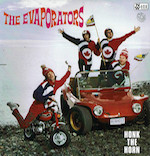 The Evaporators
The EvaporatorsHonk the Horn 7" (Nardwuar/Mint) After a lengthy convalescence, Nardwuar and friends have returned with some seriously annoying music. Now, I know there are some folks who find this manic, derivative music (supplemented by energetically whiny vocals) a real blast of fresh air. Yes, the lyrics are kinda funny. Sometimes. I'll give 'em that. But still. I know this stuff is supposed to be a joke. I mostly get it. I have a feeling, though, that I'm just not cool enough to get all of it. The funny thing is (I guess I intended that pun), the liners are clever and amusing. The Evaporators, on the other hand, are nowhere near subtle enough to call their music clever.
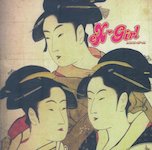 Ex-Girl
Ex-GirlBack to the Mono Kero! (Ipecac) The same unique and annoying/hypnotic vocal stylings. A lot more creativity on the musical end. Ex-Girl charms, just like before. Whether spinning vaguely prog thoughts or offbeat throbbing pop balloons (including an utterly charming cover of "Pop Muzik," as hard as that might seem to believe), Ex-Girl simply refuses to stick to any rational sense of normal. It's all over the top, so much so that the entire confection comes together like some kind of pulled taffy. A lot of work and effort to produce something so effervescent and ethereal. Indeed, I'm thinking some of Ipecac honcho Mike Patton's thoughts might have passed over the Pacific to this Japanese trio. The sonic clashes perpetrated by these women create their own harmonics. Not unlike a certain band I know... I've got a feeling that folks decide to love or hate Ex-Girl within about five seconds of hearing the music. Either an immediate affinity is created with the loopy dissonance or an outright disgust well up involuntarily. Me, I'm entranced. I could listen to this forever and still find something new to appreciate.
������������������������������ Gazz Gazz (Razzberry Records) Loud, thick chords and sloughed off vocals. A lot of power, and not quite enough honey. If that's what Gazz is going after, anyway. I'm not so sure this trio is trying to play power pop. Every once in a while I get convinced, and then the stuff wanders into heavier, more atonal territory. That's what I get for trying to pigeonhole a band. I do get a bit of T.Rex and Stooges every once in a while, too. When all of these not-incompatible ideas spin together (such as on "Sex G"), the result is damned near bliss. Much of the time, though, the music is more muddled than magnificent. A lot of potential. I do think Gazz needs to define its sound a little better, not so much to help idiots like me as to simply connect with an audience. Connect a few more dots in the songwriting, make it easy on the folks. I like a lot of the instincts I hear here. Just needs a little follow through.
 Hi-Standard
Hi-StandardLove Is a Battlefield EP (Fat Wreck Chords) Four goofy love songs, including a cover of "Can't Help Falling in Love." Shows that this Japanese trio has some emotional range. As if Hi-Standard really had anything left to prove. A fun set, full of soaring hooks and a wonderfully ragged playing style. Bouncy bouncy, with just a bit of the buzzsaw guitar. Very, very nice. Really, this disc doesn't require much explanation. The fact that it's something new from Hi-Standard should set hearts to racing, and I'll happily drop the fact that this stuff is lotsa fun. That should about cover things.
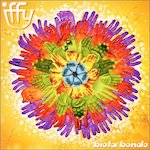 Iffy
IffyBiota Bondo (Foodchain) I got a call from a PR person telling me about this album from a band that's in that "Sugar Ray, party music kinda mode." My memory is bad (happens when you're a senior citizen like me), so I don't recall if Iffy was the band in question. The description fits, nonetheless. And it's not bad, if you don't mind an emphasis on back beats and vaguely whiny choruses. Laid back grooves, and lyrics whose content matters much less than the delivery--this stuff is supposed to sound "cool." Works, mostly. Okay, so this really isn't my scene. And since I hear stuff like this all the time at the gym, I don't think Iffy is really distinguishing itself from a larger pack. That's probably the biggest problem here. 'Cause the stuff is fine. Nothing spectacular, but fun in a silly sorta way. I think that's where the boys were aiming. Now, if they could only write that one smash hit...
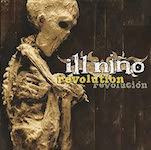 Ill Niño
Ill NiñoRevolution Revolucíon (Roadrunner) Latin survivors of the NYC metal scene (Pro-Pain, Soulfly) team up with some South American newcomers to play, well, some NYC metal. Right up the ol' Fear Factory alley, complete with hoarse falsetto vocals. There's a drummer and a percussionist. That leads to a whole lot of rhythm and even some polyrhythms. Ill Niño also isn't afraid to bring everything down and jam calmly. The dynamic and emotional range of these songs is impressive. Intense is just not an adequate term. These boys don't really take the sound to a new level, but the rhythms and range are as impressive as anything else in the scene. Each song is a new adventure. Each track impresses me more than the previous one. There was a time when I would have said this might be a little "out there" for the average listener. Not so anymore. Metal fans these days are probably more adventurous than your average listener. Something like Ill Niño just makes them salivate. Worked that way for me.
������������������������������ ������������������������������������� 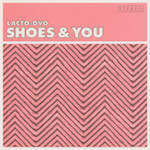 Lacto-Ovo
Lacto-OvoShoes & You (Smokeylung) The first song is a tres-June of 44 instrumental. I began to wonder what might lie beyond. Turns out that Lacto-Ovo is a minimalist pop band (complete with retro keyboard). That first track wasn't exactly an anomaly, but it isn't representative, either. Ah, but what am I bitching about? Lacto-Ovo doesn't like to stay in the same place. There is quite the VU feel to many of these songs (the lengthy "Your Sweet Shoe" in particular), and that's not unwelcome. These folks know how to set a mood. And have a little fun while hard at work. Not just on obviously playful songs like "Smurf," but in general. Lacto-Ovo lopes along, roping whatever it wants from the saddle of its mottled steed. And that's cool. This stuff fits right in the middle of what a friend of mine calls "indie-hipster pop," and so you've gotta be in a receptive mood. If you are, though, settle in for a fine ride.
������������������������������������� 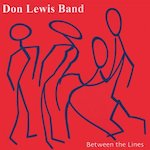 Don Lewis Band
Don Lewis BandBetween the Lines (self-released) Jaunty jangle roots rock with just a hint of the groove. The odd bit of syncopation that actually adds to a song rather than turn it into a derivative mess. I kept waiting for the pieces to degenerate into excess. They didn't. There's even a slow love song that manages to be more moving than cloying ("Believe"). These guys have been doing this for a while (there are bonus tracks on this disc from three previous releases), and they've obviously learned some important lessons. Indeed, a quick scan of those earlier songs provides a nice snapshot of how much the songwriting has improved. The bonus pieces aren't bad; the potential is obvious. But often enough, the writer got stuck and resorted to an all-too-expected backbeat or chord change. That stuff is merely middling-to-good. The eight tracks of Between the Lines, however, are great. No holds barred. Solid, bright tunes with a definite unique band character. The Don Lewis Band has come a good ways, and the latest stop is most impressive.
���������������������������������� ������������������������������������� 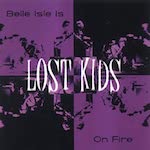 Lost Kids
Lost KidsBelle Isle Is on Fire EP (Gold Standard Laboratories) Recorded in Detroit. I shoulda known. This has that kinda feel. If that makes any sense to you. Lost Kids play ragged rock and roll with a little oomph to the bass. Insistent fare that demands a listen or few. A bit heavy with the echo at times. I mean, these are the "oughts," not the sixties. Not even the seventies. Still, I like the way these folks play. With cool abandon. That sorta detached energy that infects slowly. Surely. Long live rock and roll. As long as bands like Lost Kids are around, I think the spirit is safe. Just be sure to turn it up loud. Real loud. Let the grooves infect your soul. And spread the word.
������������������������������������� 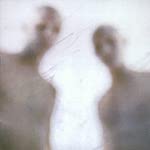 Minus
MinusJesus Christ Bobby (Victory) Some fun from Iceland. Minus sounds like U.S. Maple playing Fudge Tunnel tunes. In other words, deconstructed metallic hardcore. There is so much going on here I can hardly take in just the surface details. A complete sensory rush. I should note, for the record, that this Minus has nothing to do with the Minus I reviewed last issue. I don't think there would be any confusion, but you never know. This Minus, the one from Iceland (which is the one I'll be referring to throughout the rest of the review), simply doesn't know how to let up off the gas. Intellectually, I mean. The ideas just keep flying out of my speakers. There are two ways to listen to music like this. One is to simply ride the manic, screaming energy wave. I like that one and I took that option for a while. But in general, I prefer to take the cerebral approach. To discern as many discrete elements as possible and connect the dots my own way. Few bands are good for one of those approaches. I can think of five or six that satisfy both ways. Minus has an almost unlimited scope of sound. There's nothing these guys won't try. And there's very little that they can't do very well. This is a most astonishing and energizing album. Utterly brilliant.
������������������������������ �������������������������������������  New Town Animals
New Town AnimalsIs Your Radio Active? (Mint) So imagine if some of yer favorite early 80s new wave songs were played by the Ramones ... or perhaps more correctly, imagine if some of yer favorite early 80s bands played the Ramones. what I'm trying to say is that these songs are very basic three-chord fare played and sung with that high-pitched. snotty 'tude. Complete with fake British accents, even. Oh, I'm not complaining. The stuff is way too much fun to really bitch about. Good 'n' chunky even while the motor revs up. No let up in sight. Right. That's the secret--keep everything in motion. Don't slow down and don't look over your shoulder. Eyes straight ahead and knees churning. The rest of us can pogo around deliriously. Nothing complicated or difficult; just a big wad of rock and roll fun. Stripped down to the essentials and fed high-test fuel. Loud is better. Don't forget to smile.
������������������������������ ���������������������������������� 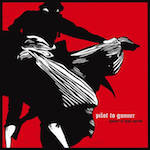 Pilot to Gunner
Pilot to GunnerGames at High Speeds (Gern Blandsten) Power emo, if you'll indulge me. Pilot to Gunner plays utterly anthemic music; the stuff comes on pretentiously from the first kick of the bass drum. But that's okay, because these boys have plenty to shout about. For starters, the grandiose sound is filled out in most imaginative ways. I'm talking about the writing; the instrumentation is standard for a four-piece. But these boys use strident lines in some of the most creative ways I've ever heard. Probably a little more into the hardcore side of things, though the lead guitar is a lot more melodic than standard emo. As for the lyrics, they're stream of consciousness, mostly. Fits right in with the aggressively inspired music. The vocals are used as an instrument, creating another line for the band members to play off. Most impressive, I've gotta say. Boy, this puppy just blew me away. From the first note to the last, Pilot to Gunner is in complete control, weaving some intricately beautiful and powerful songs. I'm floored.
������������������������������ 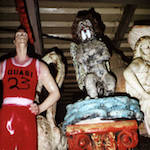 Quasi
QuasiThe Sword of God (Touch and Go) The liner notes of this album are a long ramble about some folks I don't know. Completely incomprehensible on the whole, though small parts (like the bitching about people who can't tell between organ and electric piano, distortion and reverb, etc.) are perfectly clear in and of themselves. I mention this because it kinda helps to explain Quasi, whose fantastic sounds are created by Sam Coomes and Janet Weiss. There are pictures of Weiss on drums and Coomes on an electric piano. Somebody plays guitar, too, and if the keyboards aren't adding in a bass line I think someone grabs a four-string every now and then. The music is that sorta dreamy, trippy stuff that the Beatles and Beach Boys bounced back and forth in the late 60s. Coomes' voice reminds me a bit of Matthew Sweet (a guy who's certainly not immune to the charms of this kinda sound), though he's really not much into multitracking his vocals. If harmonies are needed, Weiss joins in. Now that I've finally gotten around to (vaguely), I should also mention that Quasi has a real knack for crafting gorgeous spheres of sound. Globes that hang high in the firmament, shimmering in a thousand different ways. This stuff isn't merely pretty or beautiful. Way beyond that. Enjoy the show and be enveloped by wonderfulness.
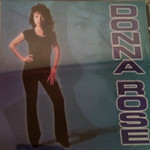 Donna Rose
Donna RoseDonna Rose EP (self-released) Donna Rose reminds me a bit of Kate Bush. Crossed with Lisa Stansfield. That sorta arty-yet-soulful delivery of emotionally-drenched songs. Just enough detachment to keep the stuff from getting mopey or syrupy. That's good. Rose has an impressive range, but she prefers to restrain her voice for the most part, focusing more on selling the power of the lyrics. Again, I think that's the right way to go. Fewer pyrotechnics, greater effect. I do wish the music behind her worked as hard as she does. It's basic midtempo stuff, plenty of professionally executed flourishes (and certainly mixed at a good level, allowing Rose to shine) but a little run-of-the-mill. I knew what was coming. I think Rose would do better to surprise more often. Still, there's no questioning her presence. Well done.
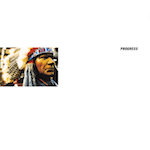 RX Bandits
RX BanditsProgress (Drive-Thru) A very shiny version of the whole aggro soul skacore sound. Lots of heavy elements, but those are simply integrated into the whole of the sound, which tends more toward a hardcore ideal. At least in terms of song construction. Reminds me a bit of all the things that Blue Meanies would do within the space of 30 seconds. Not nearly as complicated, but nonetheless the RX Bandits don't shy away from tossing more than a few ideas into the pot. And yet, the overall sound is ... restrained. You know, almost I'm the Man era Joe Jackson-ish. Actually, a lot like that, with a bit more oomph and the requisite difference in writing styles. But the stripped-down sound simply allows each of the pieces to shine in its own way. Most importantly, everything comes together in the hook. That's the way it has to be, and that's what happens. There's an awful lot of ferment going on, and the RX Bandits have distilled it into fine liquor. Quite the accomplishment.
 SIM_01
SIM_01Radiophonic Oddity (Cyclotron) Some cool collage-style electronic music, with SIM_01 functioning as the conductor of the mosaic. The compositional style is very much like Chemical Brothers, though the sound trends toward lush techno and away from an organic feel. There's no mistaking that just about everything here is electronically-produced. Which isn't a problem at all. The ideas expressed on this disc are complex. They require a large canvas to explore, and SIM_01 takes up every inch. The sound is full and inviting. And ever-changing, to boot. Even individual songs are thoughts in constant evolution. There's always a new angle to consider, another corner to turn. Kinda like what people say about the weather (just about anywhere): Wait five minutes and it will change. Well, here it's more like 30 seconds. Those changes fit; they're not simply jammed up against one another without any coherent transition. This is an immaculately crafted disc. Few sounds were left to chance, and that attention to detail raised the quality bar significantly. Lots and lots to explore here. Get lost.
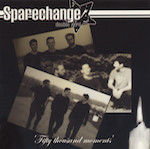 Sparechange00
Sparechange00Fifty Thousand Moments EP (Grilled Cheese-Cargo) As this EP rapidly approached its end, I was just sitting on my butt enjoying it, rather than actually writing anything. So I figured I'd look up my review of last year's album, just to see if I liked it as much. Um, yeah. Sticky, ragged hooks and blistering riffage. Eternally uptempo, the kind of stuff that makes the heart sing. You know, really good and all. Five songs are not enough. Sparechange00 has shown an astonishing propensity for cranking out utterly blissful tunes. I'm getting the idea that there's no way to stop it. And, you know, I have no idea why anyone would even want to try.
�������������������������������������  Techno Animal
Techno AnimalThe Brotherhood of the Bomb (Matador) Kevin Martin and Justin Broadrick provide the beat-ly brutality and a slew of guest MCs (El-P, Toastie Taylor and Sonic Sum among them) provide the rhymes. You know, it's about what you might expect. Loud, crazy loud, profane and excessive as hell. I mean, if you're gonna do it, you might as well do it all the way, right? Yeah, of course. And the beats are the bomb. I'm not using vernacular; I'm referring to the title. Earth-shattering, mind-thumping beats with plenty of sonic fire behind them. Gets me in a bit of the ol' Wordsound frame of mind. Boy, do I love creative beastly beat work. That's what's going on. Gotta ride this thrill pony all the way into the radioactive sunset. No other choice. Techno Animal hooks quickly and then simply won't let go. These boys have quite the pedigree. This disc is more than worthy.
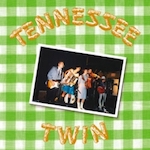 Tennessee Twin
Tennessee TwinThese Thoughts Are Occupied 7" (Mint) A double-shot of traditional country music. Cindy Wolfe fronts this eight-piece. She penned the tunes, too. Good ones. The kind that make listening to trucker radio a pleasure now and again. The kinda stuff that made Loretta Lynn a star. Lead line provided by pedal steel (is there a cooler instrument? I think not), with plenty of help from fiddle, guitars and mandolin. Wonderful melodies and some glorious harmonizin' in the choruses. If all country music sounded like this, there'd be little disagreement about its quality. Tennessee Twin makes timeless music. This tiny slab of vinyl is hardly enough to satisfy me. Most invigorating.
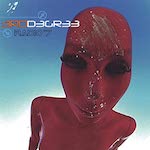 3rd Degree
3rd DegreeRadio 7 (self-released) They're not kidding with the title. This is stuff aimed directly at AAA radio. Soft jangle groove with perfect harmonies. Slickly produced. Already sounds like major label product. I used that last word advisedly. 3rd Degree sounds like the stuff that sometimes plays down at the gym. It's a satellite deal; no particular station on the dial. I don't know the names of the bands (it's really not my scene), but think you might get the idea. Boy, is this stuff overdone. Extra keyboards, strings, the whole deal. Dramatic intros leading into sparse, syncopated verses which leap headfirst into (of course) choruses with harmonies so thick they pretty well drain all the fun out of the hooks. It's all so calculated. I wonder what the demos sounded like. There's just no way to tell. That said, I think 3rd Rock has a real shot at (at least temporary) fame. I mean, this disc is ready for radio now. No post-production or re-recording necessary. By necessity, it's generic. That's part of the point. You can't be too interesting if you want to grab the brass ring. You just have to give the people what they want. 3rd Degree succeeds.
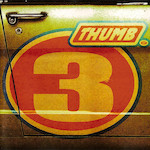 Thumb
Thumb"3" (Victory) Some German hardcore for ya. Thumb doesn't really stick to any one concept, with the exception of the loud mosh (sometimes during the chorus, sometimes in the verse, sometimes in the bridge). Otherwise, there are nods to the technical aggro of the Refused, general NYC rapcore, even the grungy distorted howl of Season to Risk (and others; that 's the example that pops off the top of my head). The important thing is that these guys write songs. Sure, there's turntable and sampling work in there, but that stuff is used properly, as flavoring. The basic cores of the songs are rooted in riffage. Like they should be. Most bands aren't willing to try what Thumb does as a matter of course. Then again, most bands wouldn't be able to make this material sound so good, either. Thumb's greatest strength is in its writing, but the playing and production are a close second (and third). The total package. This isn't yer average American hardcore band. Duh. This isn't yer average hardcore band, period. Thumb's adventurous spirit and top-notch skills make this album a real thrill ride. Just gotta hold on, because the cars are swinging side-to-side and upside-down at about a hundred miles an hour. Leaves me breathless.
������������������������������������� 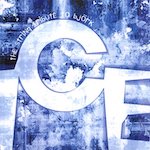 Various Artists
Various ArtistsIce: The String Tribute to Bjork (Vitamin) From the folks who brought us the electro-acoustic tribute to Bon Jovi comes this strange disc. String instrumental versions of songs that Bjork made semi-famous. I'm not big into Bjork, so I really can't compare these versions to the originals (I kinda know, like, two of the songs here). The feeling I get is that the arrangements are not exactly faithful. I mean, they're in tune and all (I know; cheap shot). They do work. As sorta pop-classical fare and in the way that they're intended, as a way to appreciate Bjork's songwriting on a different level. I'm quite sure I like this more because I don't know the originals, but that's how it is. I think tributes should take chances. This one does, and it succeeds. Pretty well, I think. In any case, I enjoyed listening to it. I can't speak for Bjork fans, but hey, this thing can stand on its own.
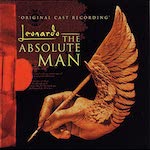 Various Artists
Various ArtistsLeonardo--The Absolute Man Original Cast Recording (Magna Carta) A prog opera, I suppose. Written by Trent Gardner and performed by a large and impressive cast, this sounds more like a concept album than a dramatic presentation. But why quibble with minor things like labels? Especially when it's so much more fun to talk about the music. When writing about Leonardo da Vinci, I suppose prog is as good a medium as anything. And while this is certainly technical and intricate, there is plenty of emotion and feeling in the performances. Overwrought? A little. But, you know, that's kinda built into the genre. What I like is that Gardner has used some of the more excessive elements of prog to help flesh out his story and to add some dramatic flair. If this isn't intended to be an actual musical (I really can't imagine a high school putting it one any time soon), nonetheless it works as an album. Rousing, exciting songs built into a solid story. Good work.
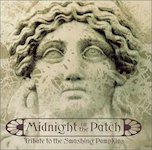 Various Artists
Various ArtistsMidnight in the Patch: A Tribute to the Smashing Pumpkins (Vitamin-CMH) As you might be able to tell from the one Smashing Pumpkins review I've got in the archives, I'm not the world's biggest fan. Though the album I reviewed wasn't exactly well-received. The reworkings here are generally, though not exclusively, of an electronic, goth or industrial nature, and so they don't really stray a long ways from the originals. They're quite competent, and in a couple cases I have to say I like the version here to the originals. Still, I'd like to hear more than simple run-throughs. This is a well-executed tribute, but there just isn't enough of an adventurous spirit to carry the weight of the entire disc. Interesting at times, but too uneven to really get behind.
Various Artists Space 380: Transmission Three (Space 380) Kind of a sampler from a web site and promotion company, I believe. You can check out http://www.relaxonline.com to see what's going on. All of the songs on the compilation are available at the site. H3llb3nt and Pigface are the two bands I know on this disc. But this isn't just an electro-industrial attack. Most of the stuff is a little less edgy, trending toward alternative radio--whether it be punk, pop, world beat or whathaveyou. Most of it's pretty good, at worst. Alright, a couple of tracks really annoyed me, but that's gonna happen with just about any compilation. This set is good enough to get me to check out what these folks are doing. In other words, it did the job.
������������������������������������� 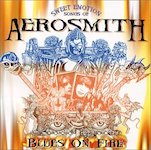 Various Artists
Various ArtistsSweet Emotion: Songs of Aerosmith (Hip Heavy Mama-Navarre) Certainly, if a rock band deserved a blues tribute it would be Aerosmith. And this one works, most of the time. Just depends on the song. And the artist. For example, no matter how hard Otis Clay tries to sell it, "Cryin'" just doesn't work real well, even as an overblown, overproduced kinda blues. On the other hand, Pinetop Perkins, Rusty Zinn and Ronnie Baker Brooks turn out "Walk This Way" in a most cool fashion. Some songs, like "Last Child," were awfully bluesy to begin with, and the versions of such songs here really don't get away from the original quite enough. On the other hand, Marshall Crenshaw and Sugar Blue's rip through the novelty tune "Big Ten Inch Record" (a cover in and of itself) is fun, if not particularly unique. There's good and there's bad. There's interesting and there's kinda rote and dull. The inspired and the insipid sit right next to each other. The usual tribute blues, I guess.
������������������������������ 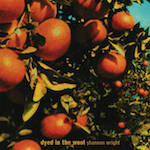 Shannon Wright
Shannon WrightDyed in the Wool (Quarterstick) Whereupon Shannon Wright gives up the intense solo life, recruits a band and rocks out. Dig it the most. Oh, that's a cheap shot, and I don't know why I threw it. After all, Wright still plays most of the instruments here, even if she does tour with a band nowadays. I think working out these songs with a band has reduced some of Wright's idiosyncratic wanderings, though she's still taking as many chances as before. Actually, there moments where the band actually might have driven Wright further than she might have ventured before. Certainly, this is the most harrowing album Wright has recorded. She never has asked for any quarter, and on this album none is given. Rather, she's striking out with the same passion and intensity as she always has. Well, with more of just about everything. Simply a distillation of the wonder of her first two solo albums. Wright sounds like she's really coming into her own as a songwriter and performer. This disc blisters my fingers. ������������������������������������� |
|
return to A&A home page